The Sixties 1861 - 1864
|
• Historical fact • Bonanza history as drawn from episodes (more or less) • From the 'Dreaming Eagle' (or of utmost importance to it...;) |

Virginia City 1861 (drawing) - View from the Gould & Curry claim January 1, 1861 -
January 1861 -
January 27, 1861 -
Spring 1861 -
Spring 1861 -
February 26 to March 2, 1861 -

Lincoln 1861 March 4, 1861 -
March 22, 1861 -
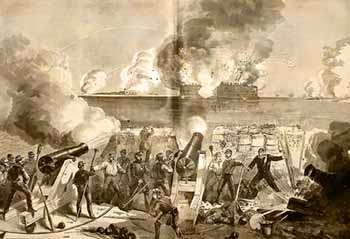
Attack on Ft. Sumter (Harper's Weekly 1861) April 12-13, 1861
June 6, 1861 -
June 6, 1861 -
Southern sympathizers that were found in the Comstock district were taken into 'custody'. They were brought to Fort Churchill where they were kept busy with what could be considered corporal punishment. It was reported by a traveler that the sympathizers were given special treatment, a special form of exhaustive work. A twenty foot chain was locked around the prisoner's ankles, the other end fastened to a short post. Then for two hours he was forced to walk at chain's length around the post carrying a fifty pound sack of dirt on his back. 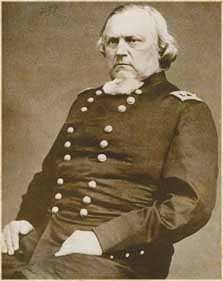
Gov. James Nye July 4th, 1861 -
July 7, 1861 -
During the month of July, Nye issued three proclamations: the first named his appointees to various territorial offices (July 12), the second announced the creation of a judiciary (July 17), and the third called for elections to be held on August 31 for the purpose of selecting a delegate to Congress and members ot the territorial legislature (July 24). Later this summer, Nye established a supreme court, three district courts, probate courts and justices of the peace. Three Lincoln-appointed territorial judges each heard cases on original jurisdictions in one of the three district courts, and all three sat en banc as the supreme court to hear appeals. Summer 1861-
August 31, 1861 -
October 1, 1861 -
Also, the territory's capital was chosen, which led to a barroom brawl between a Virginia City councilman and a Carson City representative. By a vote of 15 to 9, it was decided that Carson City would be the territory's new capital. Further, the territory was divided into nine counties: Churchill, Douglas, Esmeralda, Humboldt, Lyon, Ormsby (later to become Carson City County), Storey, Washoe and Lake Counties, each to be governed by a three-member-board of commissioners. Given the location of the Ponderosa, would be in both Ormsby and Washoe County - while Virginia City was in Storey County. Means that the authority of the Virginia City sheriff did not extend to Ponderosa land. I've crudely marked the Ponderosa in a map of 1863, in green. As you can see, Reno is missing, as it didn't come into existance before 1868. Until then, it was nothing but a family-owned settlement known as Lake's Crossing. 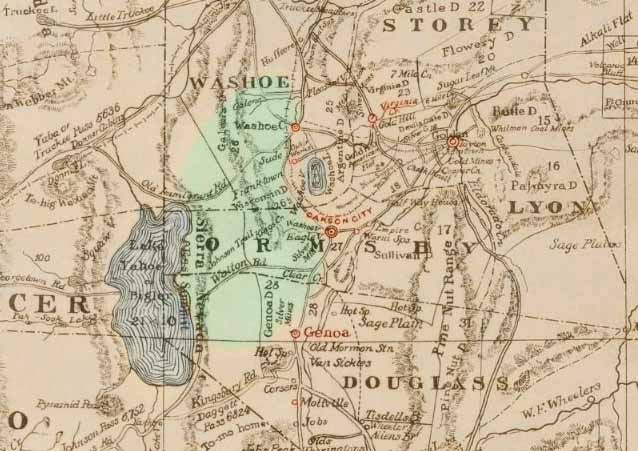
If Ben was too happy with folks building roads in his land? October 24, 1861 -
1861 -
December 11, 1861-
Of course, we all know that, apart from a few hapless temporaries, the one and only sheriff of Storey County and thus Virginia City was Roy Coffee... June 21, 1861 -
August 1861 -
September 14, 1861 -
Here is a long row of buildings in Virginia City 1861 - taken from the frameworks of the drawing above. Move over the arrows to scroll through the images. 1861 -
Nevada's population was recorded at 14,404 persons, with about 4,581 persons, residing in and around Virginia City. |
|
Winter 1861-62
January 1, 1862 -
February - July 1862 -
Spring 1862 -
August 6, 1862 -
Little Joe's leaning to the South suddenly becomes a completely new shine. I mean, who would not reject such a police state? |
|
January 1, 1863 -
January 8, 1863 -
January 29, 1863 -
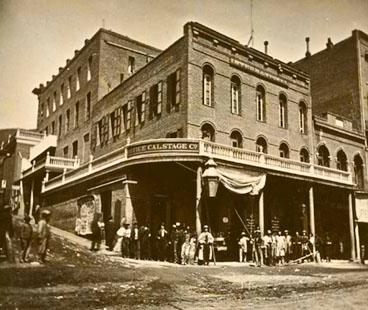
The International Hotel - quite a difference to what it looked like less than 2 years before... Fenruary 1863 -
February 24, 1863 -
July 3, 1863 -

Lotta Crabtree July 1863 -
Lotta Crabtree was prominently featured in season one's episode one 'A Rose for Lotta' - and thus put an early end to any attempts to place the episodes in a historical context based on their themes. It simply wouldn't work - just figure that according to Bonanza lore, Little Joe rode in the Pony Express (1860-61) several years after meeting Miss Crabtree (1863)... Instead, I've only used 'episode facts' as far as they concerned the family, for example who was born when and where, or if it depicted where the Cartwrights might have been at a given time. It's not perfect, of course, but your best bet to have any conclusive timeframe at all. Talking of ladies, 1863 marks the year in which Julia Bulette arrived in Virginia
City to work as a prostitute. Her tale became grossly romanticized by later writers,
yet it was true that she was respected by Virginia City's fire-fighters and her
tragic murder in 1867 received much public attention (as did the hanging of her
murderer in1868).
September 1863 -
November and December 1863 -
1863 -

Virginia City's C-Street (around 1864) By this time, the differences between actual Virginia City and the Virginia City depicted in the series began to grow to vast dimensions. Not only that Sheriff Coffee wouldn't have anything to say in 'Cartwright land' for being in another county, his nice little sheriff's office plus jail would have been a wee bit out of place.
Personally, I would have been happier if the series had centered around Carson City, which would have looked more like the town we grew used to. 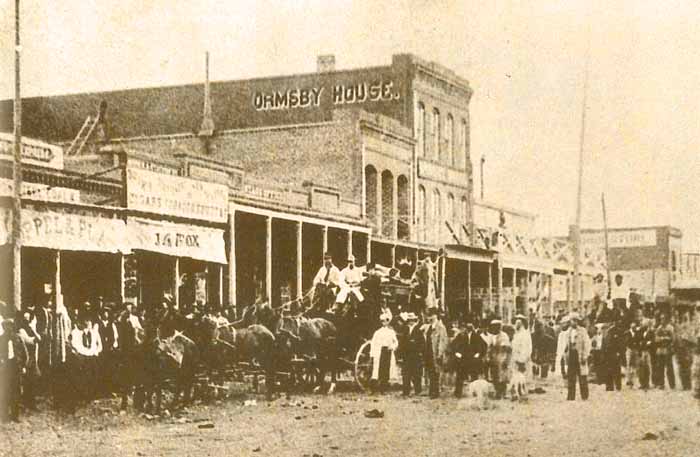
Wells Fargo stagecoach in front of the Ormsby Hotel in
Carson City, 1863,
Another photo of Carson City, taken from south down Carson Street in 1864: 
Hey, who is that man standing at the fence? |
|
1864 -
January 1864 -
February 8, 1864 -
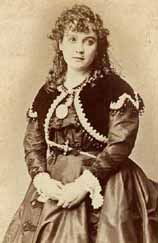
Adah Isaacs Menken February 27, 1864 -
Spring to summer 1864 -
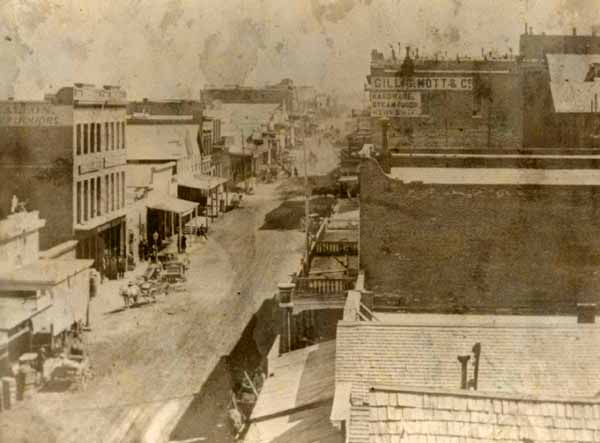
Virginia City's C-street seen from the International Hotel 1864 End of May, 1864 -
May to June 1864 -
July 1864 -
It was never stated when exactly Adam left the Ponderosa, but it must have been before the Civil War ended. Therefore, my timeline ends here. |
